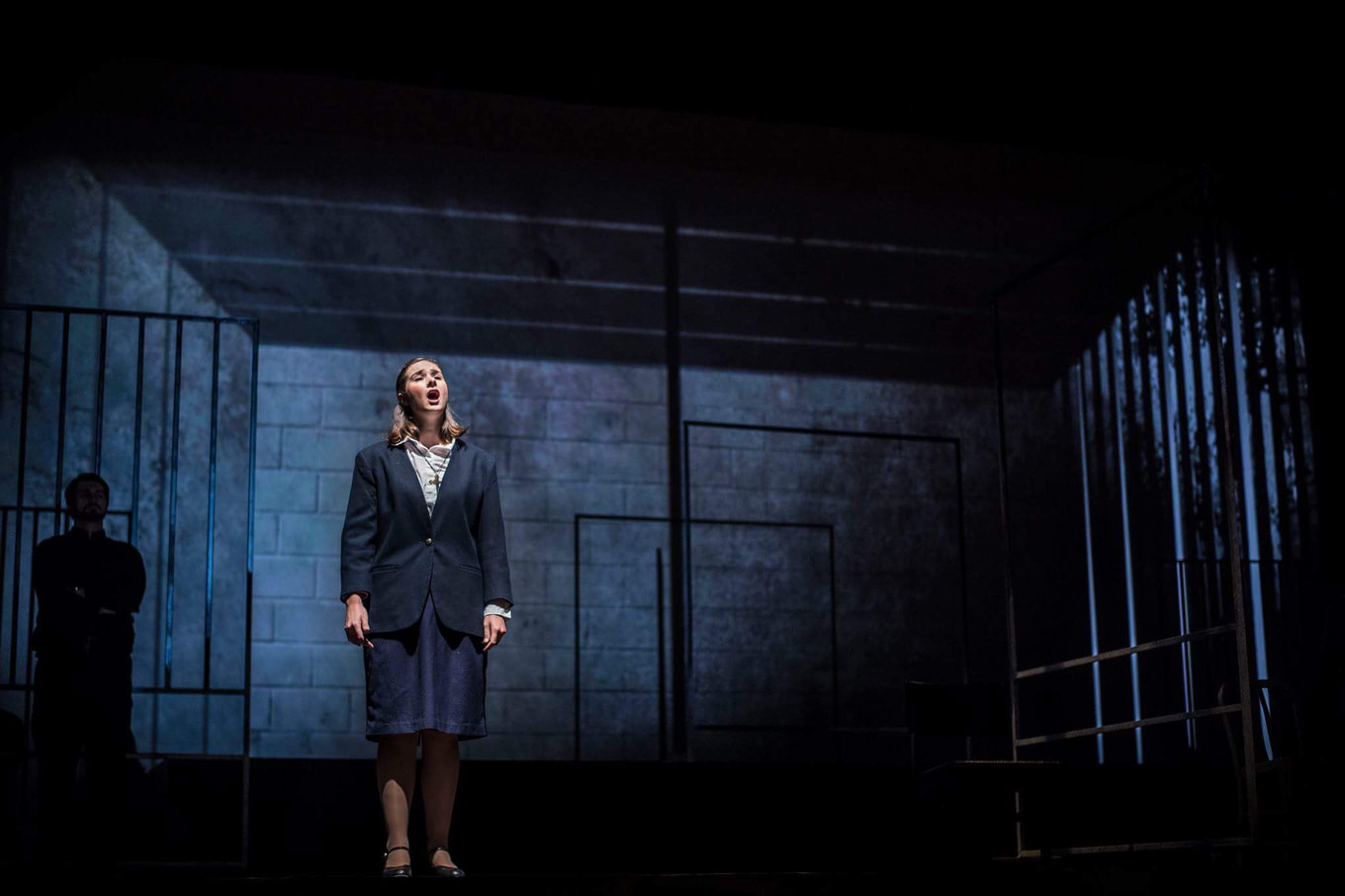
In review: Dead Man Walking at Miami Music Festival
ReviewThe Louisiana State Penitentiary, known as Angola, is the largest maximum-security prison in the United States. Most of the inmates – nearly three-quarters – are serving life sentences without the possibility of parole, in a state known for its stringent sentencing laws.
It is within the walls of Angola that the mismatched protagonists of Dead Man Walking meet for the first time: Joseph De Rocher, sentenced to death row for the rape and murder of a seventeen-year-old girl; and Sister Helen Prejean, De Rocher’s pen pal, an idealistic nun determined to see good in a man who has committed undeniable evil.
“Do I look like the monster they all say I am?” De Rocher asks at their first meeting.
“You look like someone I’d pass on the street,” Sister Helen replies.
Miami Music Festival’s Opera Institute delivered a moving performance of American composer Jake Heggie’s 2000 opera, joined by the full MMF Orchestra under the baton of Bradley Moore. The July 29 performance on the campus of Barry University starred mezzo-soprano Kaitlyn McMonigle as Sister Helen and baritone Eric Viñas as De Rocher, in a second show following the opera’s South Florida premiere earlier this week.
Dead Man Walking is based on the real-life Sister Helen Prejean’s account of her work as a spiritual advisor for Angola’s death row inmates, one of whom, Patrick Sonnier, inspired librettist Terrence McNally’s improbably sympathetic De Rocher. Like Sonnier’s 1984 turn in the electric chair, De Rocher’s lethal injection was the opera’s inevitable conclusion – despite a Hail-Mary appeal hearing during which De Rocher’s mother, sung stirringly by mezzo-soprano Pauline ‘Ofa Vaitafa Tamale, recalled a tortoiseshell comb Joseph had given her for Mothers’ Day. Could someone who once gave his mother such a thoughtful gift truly deserve to die?
Or, as Sister Helen asks the parents of De Rocher’s victim, “Do we deserve to kill him?”
Viñas’ crooning, cocky De Rocher stole the show, at once raw, frightened, and menacing. Singing Heggie’s cleverly crafted leitmotive à la Delta blues, Viñas captured De Rocher’s anger and desperation with languid, smoky finesse. Occasional forays into a tender high range were each delivered with a skillful decrescendo al niente.
Opposite Viñas, McMonigle sang a compelling, devout, and at times lighthearted Sister Helen – though lacking the range of facial expression Susan Sarandon managed in the same role on the silver screen. McMonigle’s agile mezzo primly conquered Heggie’s sweeping melodies and hymntune motives, and her interactions with Viñas’ De Rocher were powerfully sincere.
As Sister Rose, friend of Sister Helen, soprano Naomi Worley sang warmly and drew laughs from the audience. Tenor Mark Tempesta sang solidly as stern prison chaplain Father Grenville, convinced that Sister Helen’s mission – to elicit and, ultimately, forgive De Rocher’s confession of guilt – was a futile one.

Musically, ensemble numbers shone, with the full-company finales of each act packing a powerful punch. A quartet of grieving parents – soprano Marina Hogue, mezzo-soprano Rachel Davies, tenor JeongMin Huh, and baritone Tyler Koch – confronted Sister Helen at De Rocher’s appeal hearing, condemning her sympathy for the man responsible for their children’s deaths. Heggie wove the four voices in frantic counterpoint beneath the melodic, pained pleas of Tamale’s Mrs. De Rocher, in what turned out to be one of the most beautifully composed and performed moments in the show.
Sparse set and props – metal bars and frames, a table, two chairs – were backed by designer Yuki Izumihara’s projections. While Izumihara’s black-and- white collage of newspaper headlines surrounding the murder and trial were eerily captivating, the most effective scenes took place not amid her busy, conceptual backdrops, but rather in front of a simple brick wall.
The MMF Orchestra delivered a strong performance, the violins’ occasional struggles with intonation counterbalanced by stellar teamwork in the percussion section and emotive solos by principal oboist Liza Saracina.
Prior to the performance, Miami Music Festival founder and artistic director Michael Rossi warned the audience of graphic violence and strong adult language to come. “It’s not a family show,” he said.
The violence came straight away: a prologue depicting the rape and violent stabbing of a teenage girl by De Rocher, and the shooting death of her boyfriend by De Rocher’s brother. The audience was left with no question of Joseph De Rocher’s guilt – but Sister Helen’s resolute narrative transformed the convicted murderer into a man who is conflicted, complicated, and deeply human. In the final scene, De Rocher was administered the lethal injection, strapped upright to a gurney in imagery undoubtedly evoking a crucifixion. The audience, then, was left with questions: did De Rocher’s death truly achieve justice? In admitting his guilt, did he open himself to forgiveness? Or were his horrible crimes simply unforgivable?
These are the questions the real Helen Prejean wanted her readers to contemplate. Through this opera, the audience became, like Sister Helen, eyewitnesses to the complex and questionable system of capital punishment; like Helen, they developed a relationship with De Rocher, with his guilt and anger and fear of death. And maybe – just maybe – they left the concert hall with a bit of sympathy in their hearts, for De Rocher, for Angola, and for the nearly 3,000 inmates currently on death row throughout the United States.
Or maybe that’s too much to ask of an opera.


Comments